Health and Social Care: An Assessor's Role and Ethics Essay
VerifiedAdded on 2020/11/23
|8
|1244
|352
Essay
AI Summary
This essay provides an in-depth analysis of the health and social care field, focusing on the role of an assessor and the practical aspects of creating care packages. The author, Gina, recounts her experiences as an assessor, detailing her interactions with clients like Marian, who required a hip replacement. The essay highlights the importance of Kolb's learning style, emphasizing how experience shapes understanding and decision-making in healthcare. It also explores the ethical considerations and professional responsibilities that assessors must navigate, balancing personal values with organizational protocols. The author reflects on the challenges of adhering to professional ethics while ensuring patient needs are met, ultimately demonstrating the importance of a patient-centered approach and the successful development of care plans. The essay concludes by emphasizing the satisfaction derived from fulfilling client needs and achieving set goals within a defined timeframe. The essay references several academic sources to support its arguments and provide a broader context for the discussion.
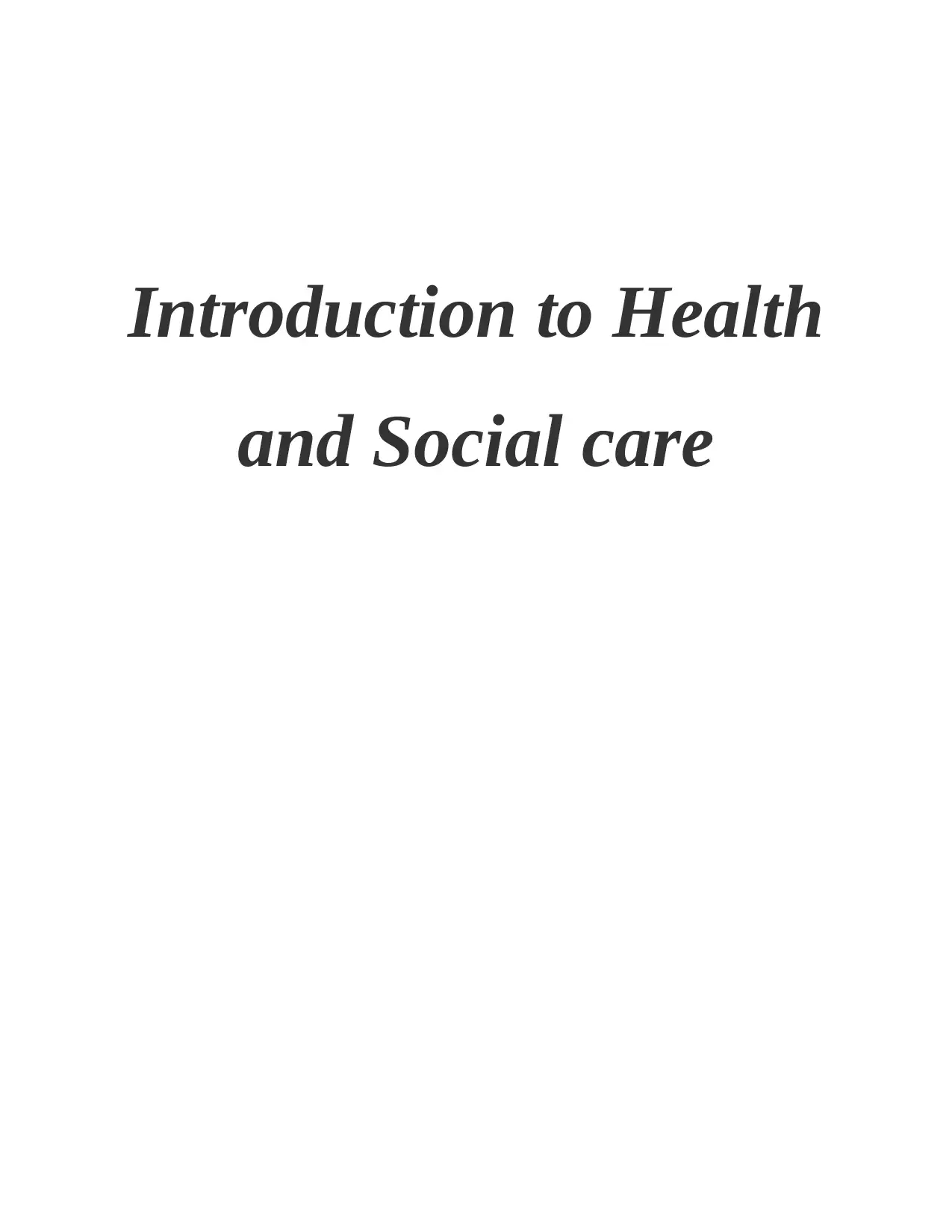
Introduction to Health
and Social care
and Social care
Paraphrase This Document
Need a fresh take? Get an instant paraphrase of this document with our AI Paraphraser
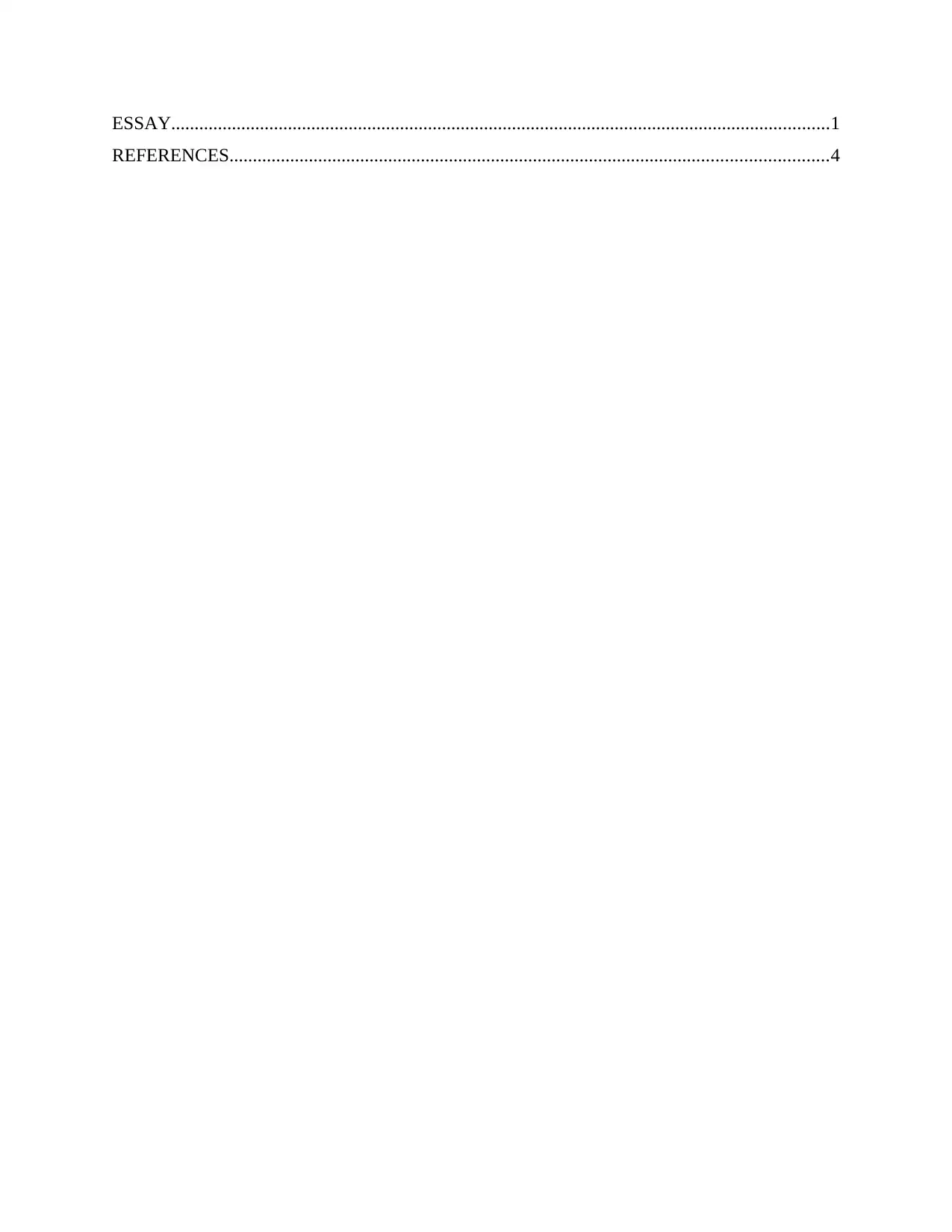
ESSAY.............................................................................................................................................1
REFERENCES................................................................................................................................4
REFERENCES................................................................................................................................4
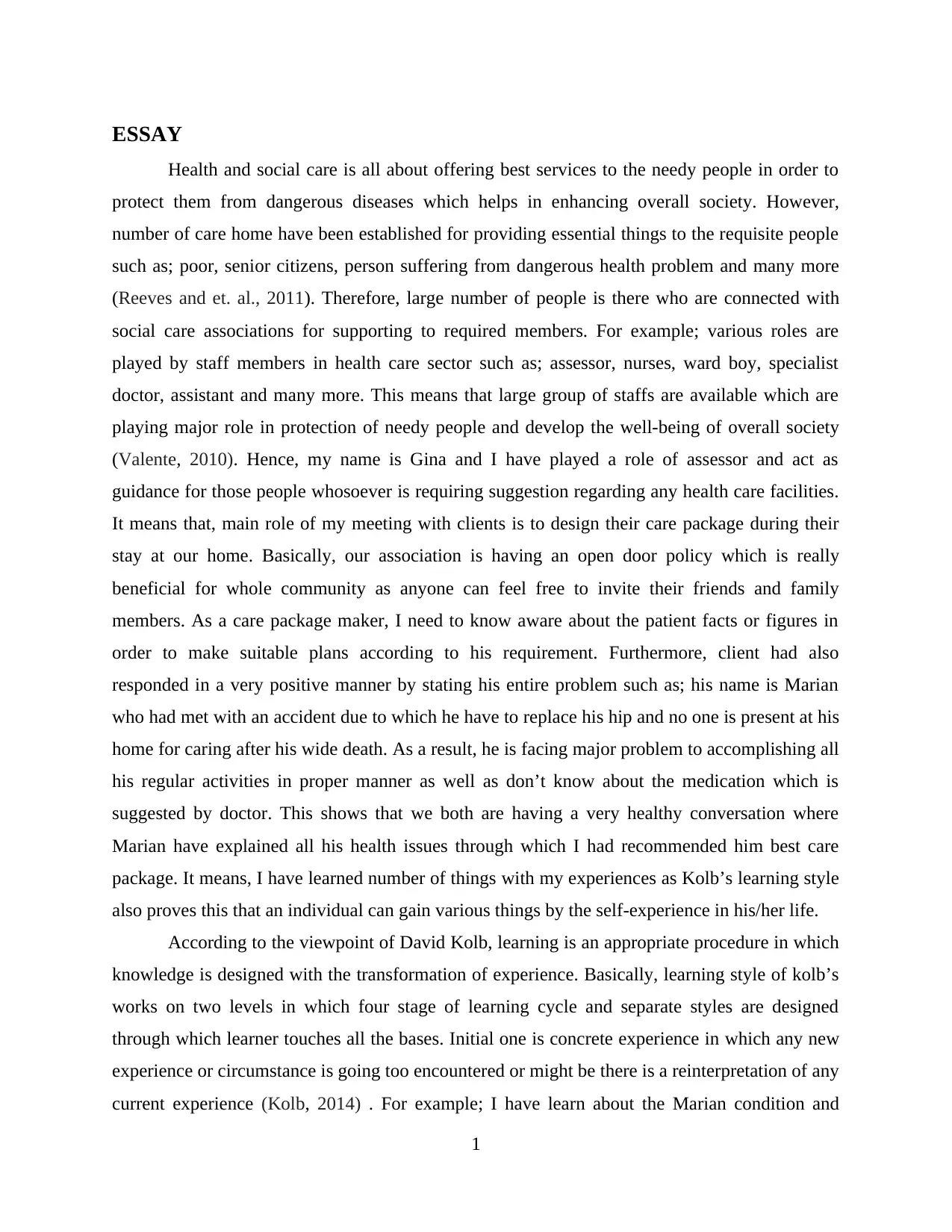
ESSAY
Health and social care is all about offering best services to the needy people in order to
protect them from dangerous diseases which helps in enhancing overall society. However,
number of care home have been established for providing essential things to the requisite people
such as; poor, senior citizens, person suffering from dangerous health problem and many more
(Reeves and et. al., 2011). Therefore, large number of people is there who are connected with
social care associations for supporting to required members. For example; various roles are
played by staff members in health care sector such as; assessor, nurses, ward boy, specialist
doctor, assistant and many more. This means that large group of staffs are available which are
playing major role in protection of needy people and develop the well-being of overall society
(Valente, 2010). Hence, my name is Gina and I have played a role of assessor and act as
guidance for those people whosoever is requiring suggestion regarding any health care facilities.
It means that, main role of my meeting with clients is to design their care package during their
stay at our home. Basically, our association is having an open door policy which is really
beneficial for whole community as anyone can feel free to invite their friends and family
members. As a care package maker, I need to know aware about the patient facts or figures in
order to make suitable plans according to his requirement. Furthermore, client had also
responded in a very positive manner by stating his entire problem such as; his name is Marian
who had met with an accident due to which he have to replace his hip and no one is present at his
home for caring after his wide death. As a result, he is facing major problem to accomplishing all
his regular activities in proper manner as well as don’t know about the medication which is
suggested by doctor. This shows that we both are having a very healthy conversation where
Marian have explained all his health issues through which I had recommended him best care
package. It means, I have learned number of things with my experiences as Kolb’s learning style
also proves this that an individual can gain various things by the self-experience in his/her life.
According to the viewpoint of David Kolb, learning is an appropriate procedure in which
knowledge is designed with the transformation of experience. Basically, learning style of kolb’s
works on two levels in which four stage of learning cycle and separate styles are designed
through which learner touches all the bases. Initial one is concrete experience in which any new
experience or circumstance is going too encountered or might be there is a reinterpretation of any
current experience (Kolb, 2014) . For example; I have learn about the Marian condition and
1
Health and social care is all about offering best services to the needy people in order to
protect them from dangerous diseases which helps in enhancing overall society. However,
number of care home have been established for providing essential things to the requisite people
such as; poor, senior citizens, person suffering from dangerous health problem and many more
(Reeves and et. al., 2011). Therefore, large number of people is there who are connected with
social care associations for supporting to required members. For example; various roles are
played by staff members in health care sector such as; assessor, nurses, ward boy, specialist
doctor, assistant and many more. This means that large group of staffs are available which are
playing major role in protection of needy people and develop the well-being of overall society
(Valente, 2010). Hence, my name is Gina and I have played a role of assessor and act as
guidance for those people whosoever is requiring suggestion regarding any health care facilities.
It means that, main role of my meeting with clients is to design their care package during their
stay at our home. Basically, our association is having an open door policy which is really
beneficial for whole community as anyone can feel free to invite their friends and family
members. As a care package maker, I need to know aware about the patient facts or figures in
order to make suitable plans according to his requirement. Furthermore, client had also
responded in a very positive manner by stating his entire problem such as; his name is Marian
who had met with an accident due to which he have to replace his hip and no one is present at his
home for caring after his wide death. As a result, he is facing major problem to accomplishing all
his regular activities in proper manner as well as don’t know about the medication which is
suggested by doctor. This shows that we both are having a very healthy conversation where
Marian have explained all his health issues through which I had recommended him best care
package. It means, I have learned number of things with my experiences as Kolb’s learning style
also proves this that an individual can gain various things by the self-experience in his/her life.
According to the viewpoint of David Kolb, learning is an appropriate procedure in which
knowledge is designed with the transformation of experience. Basically, learning style of kolb’s
works on two levels in which four stage of learning cycle and separate styles are designed
through which learner touches all the bases. Initial one is concrete experience in which any new
experience or circumstance is going too encountered or might be there is a reinterpretation of any
current experience (Kolb, 2014) . For example; I have learn about the Marian condition and
1
⊘ This is a preview!⊘
Do you want full access?
Subscribe today to unlock all pages.

Trusted by 1+ million students worldwide
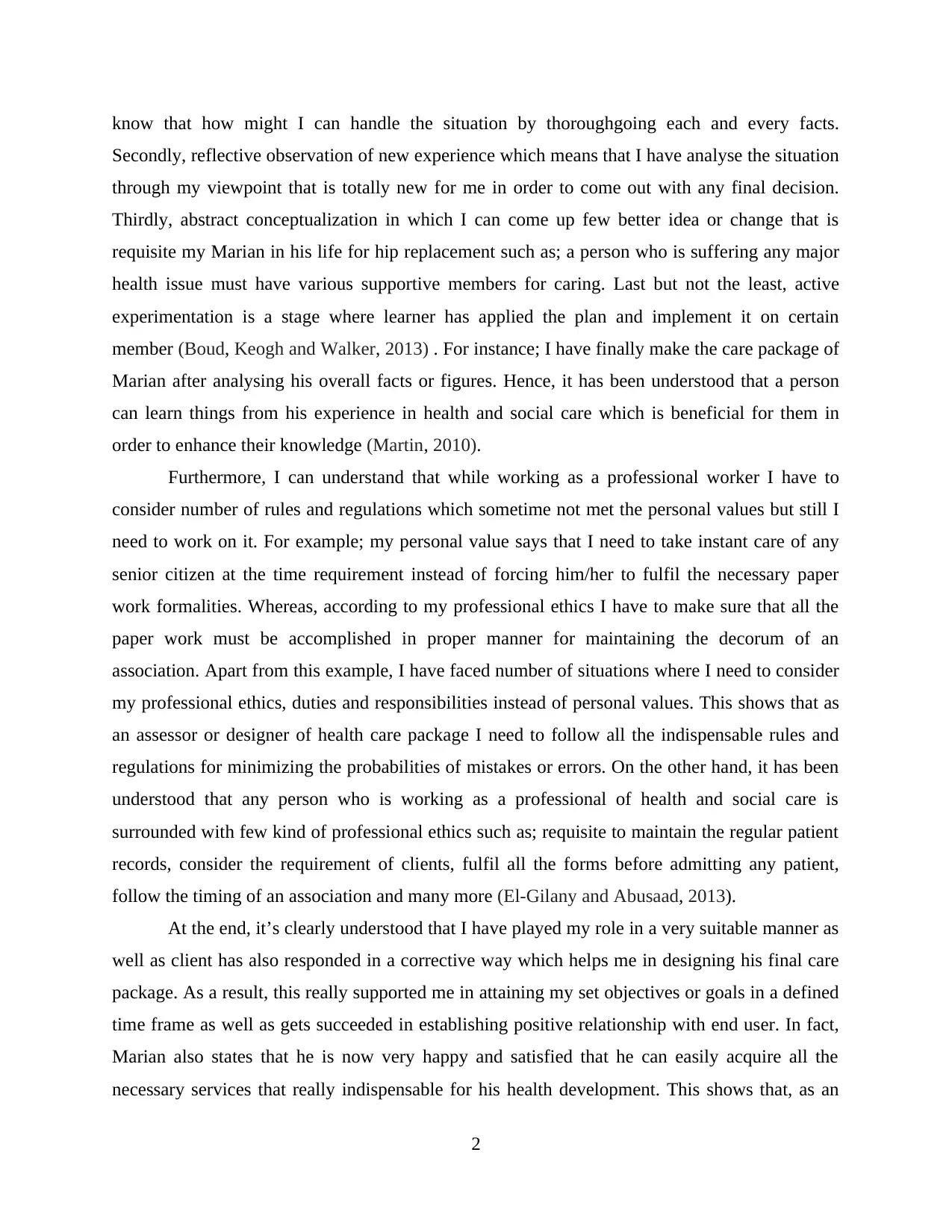
know that how might I can handle the situation by thoroughgoing each and every facts.
Secondly, reflective observation of new experience which means that I have analyse the situation
through my viewpoint that is totally new for me in order to come out with any final decision.
Thirdly, abstract conceptualization in which I can come up few better idea or change that is
requisite my Marian in his life for hip replacement such as; a person who is suffering any major
health issue must have various supportive members for caring. Last but not the least, active
experimentation is a stage where learner has applied the plan and implement it on certain
member (Boud, Keogh and Walker, 2013) . For instance; I have finally make the care package of
Marian after analysing his overall facts or figures. Hence, it has been understood that a person
can learn things from his experience in health and social care which is beneficial for them in
order to enhance their knowledge (Martin, 2010).
Furthermore, I can understand that while working as a professional worker I have to
consider number of rules and regulations which sometime not met the personal values but still I
need to work on it. For example; my personal value says that I need to take instant care of any
senior citizen at the time requirement instead of forcing him/her to fulfil the necessary paper
work formalities. Whereas, according to my professional ethics I have to make sure that all the
paper work must be accomplished in proper manner for maintaining the decorum of an
association. Apart from this example, I have faced number of situations where I need to consider
my professional ethics, duties and responsibilities instead of personal values. This shows that as
an assessor or designer of health care package I need to follow all the indispensable rules and
regulations for minimizing the probabilities of mistakes or errors. On the other hand, it has been
understood that any person who is working as a professional of health and social care is
surrounded with few kind of professional ethics such as; requisite to maintain the regular patient
records, consider the requirement of clients, fulfil all the forms before admitting any patient,
follow the timing of an association and many more (El-Gilany and Abusaad, 2013).
At the end, it’s clearly understood that I have played my role in a very suitable manner as
well as client has also responded in a corrective way which helps me in designing his final care
package. As a result, this really supported me in attaining my set objectives or goals in a defined
time frame as well as gets succeeded in establishing positive relationship with end user. In fact,
Marian also states that he is now very happy and satisfied that he can easily acquire all the
necessary services that really indispensable for his health development. This shows that, as an
2
Secondly, reflective observation of new experience which means that I have analyse the situation
through my viewpoint that is totally new for me in order to come out with any final decision.
Thirdly, abstract conceptualization in which I can come up few better idea or change that is
requisite my Marian in his life for hip replacement such as; a person who is suffering any major
health issue must have various supportive members for caring. Last but not the least, active
experimentation is a stage where learner has applied the plan and implement it on certain
member (Boud, Keogh and Walker, 2013) . For instance; I have finally make the care package of
Marian after analysing his overall facts or figures. Hence, it has been understood that a person
can learn things from his experience in health and social care which is beneficial for them in
order to enhance their knowledge (Martin, 2010).
Furthermore, I can understand that while working as a professional worker I have to
consider number of rules and regulations which sometime not met the personal values but still I
need to work on it. For example; my personal value says that I need to take instant care of any
senior citizen at the time requirement instead of forcing him/her to fulfil the necessary paper
work formalities. Whereas, according to my professional ethics I have to make sure that all the
paper work must be accomplished in proper manner for maintaining the decorum of an
association. Apart from this example, I have faced number of situations where I need to consider
my professional ethics, duties and responsibilities instead of personal values. This shows that as
an assessor or designer of health care package I need to follow all the indispensable rules and
regulations for minimizing the probabilities of mistakes or errors. On the other hand, it has been
understood that any person who is working as a professional of health and social care is
surrounded with few kind of professional ethics such as; requisite to maintain the regular patient
records, consider the requirement of clients, fulfil all the forms before admitting any patient,
follow the timing of an association and many more (El-Gilany and Abusaad, 2013).
At the end, it’s clearly understood that I have played my role in a very suitable manner as
well as client has also responded in a corrective way which helps me in designing his final care
package. As a result, this really supported me in attaining my set objectives or goals in a defined
time frame as well as gets succeeded in establishing positive relationship with end user. In fact,
Marian also states that he is now very happy and satisfied that he can easily acquire all the
necessary services that really indispensable for his health development. This shows that, as an
2
Paraphrase This Document
Need a fresh take? Get an instant paraphrase of this document with our AI Paraphraser
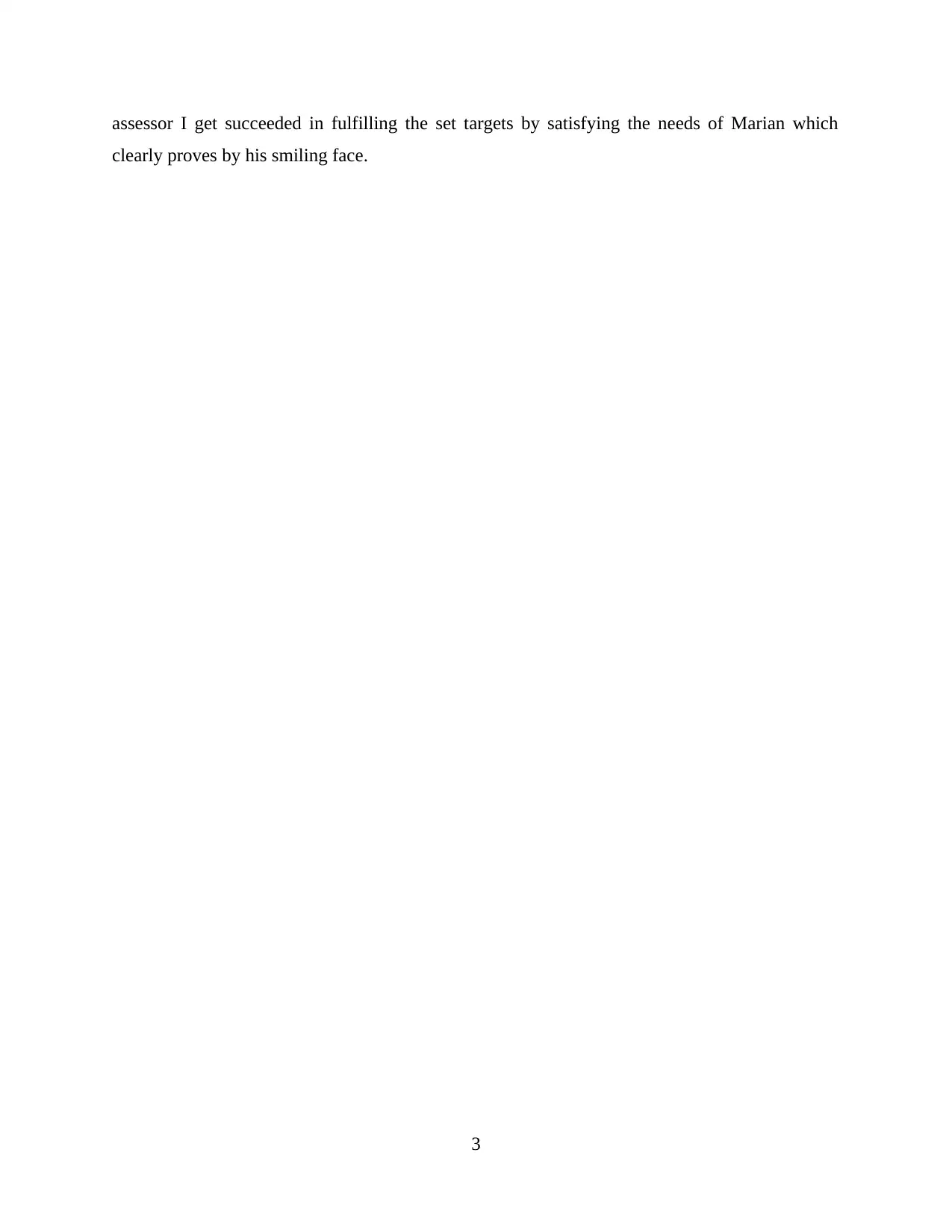
assessor I get succeeded in fulfilling the set targets by satisfying the needs of Marian which
clearly proves by his smiling face.
3
clearly proves by his smiling face.
3
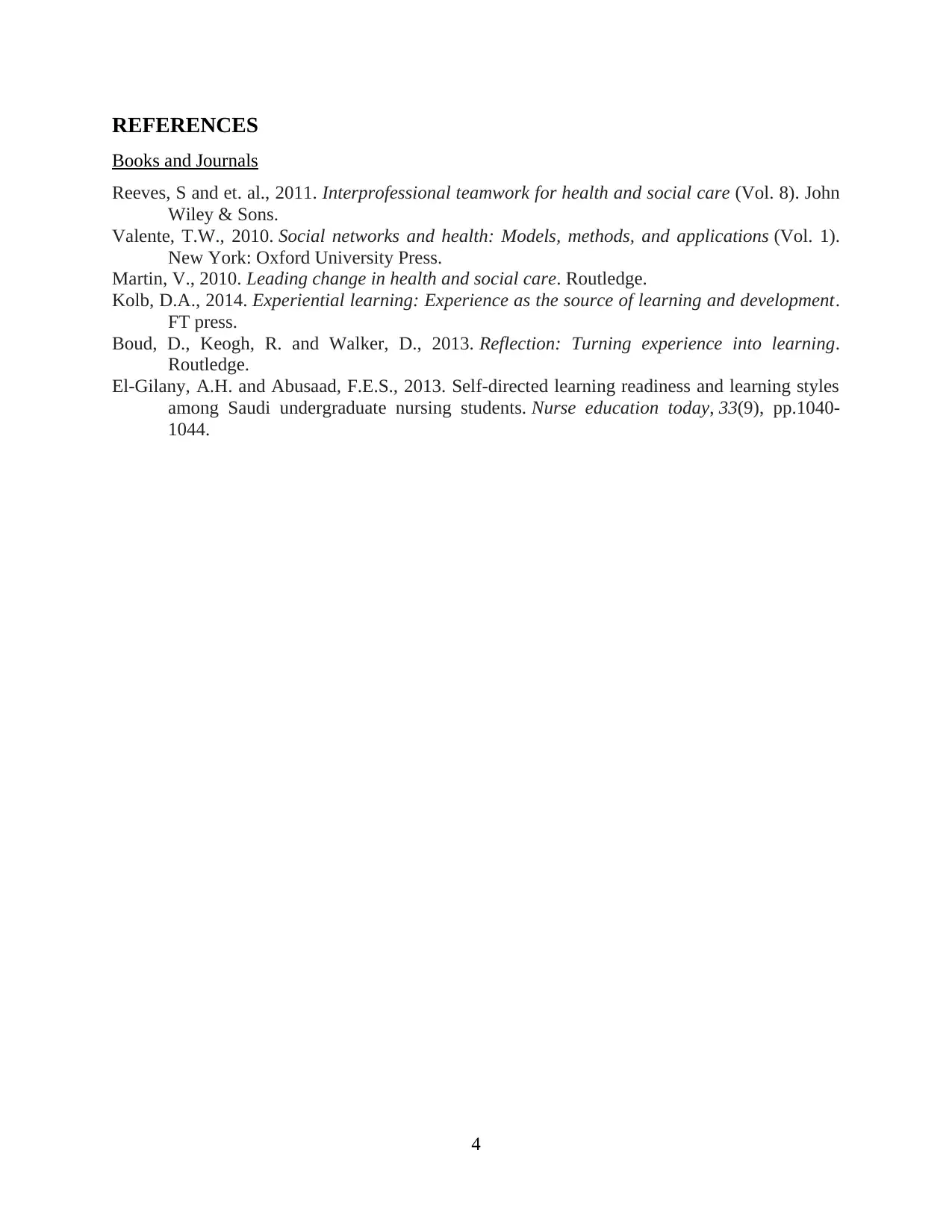
REFERENCES
Books and Journals
Reeves, S and et. al., 2011. Interprofessional teamwork for health and social care (Vol. 8). John
Wiley & Sons.
Valente, T.W., 2010. Social networks and health: Models, methods, and applications (Vol. 1).
New York: Oxford University Press.
Martin, V., 2010. Leading change in health and social care. Routledge.
Kolb, D.A., 2014. Experiential learning: Experience as the source of learning and development.
FT press.
Boud, D., Keogh, R. and Walker, D., 2013. Reflection: Turning experience into learning.
Routledge.
El-Gilany, A.H. and Abusaad, F.E.S., 2013. Self-directed learning readiness and learning styles
among Saudi undergraduate nursing students. Nurse education today, 33(9), pp.1040-
1044.
4
Books and Journals
Reeves, S and et. al., 2011. Interprofessional teamwork for health and social care (Vol. 8). John
Wiley & Sons.
Valente, T.W., 2010. Social networks and health: Models, methods, and applications (Vol. 1).
New York: Oxford University Press.
Martin, V., 2010. Leading change in health and social care. Routledge.
Kolb, D.A., 2014. Experiential learning: Experience as the source of learning and development.
FT press.
Boud, D., Keogh, R. and Walker, D., 2013. Reflection: Turning experience into learning.
Routledge.
El-Gilany, A.H. and Abusaad, F.E.S., 2013. Self-directed learning readiness and learning styles
among Saudi undergraduate nursing students. Nurse education today, 33(9), pp.1040-
1044.
4
⊘ This is a preview!⊘
Do you want full access?
Subscribe today to unlock all pages.

Trusted by 1+ million students worldwide
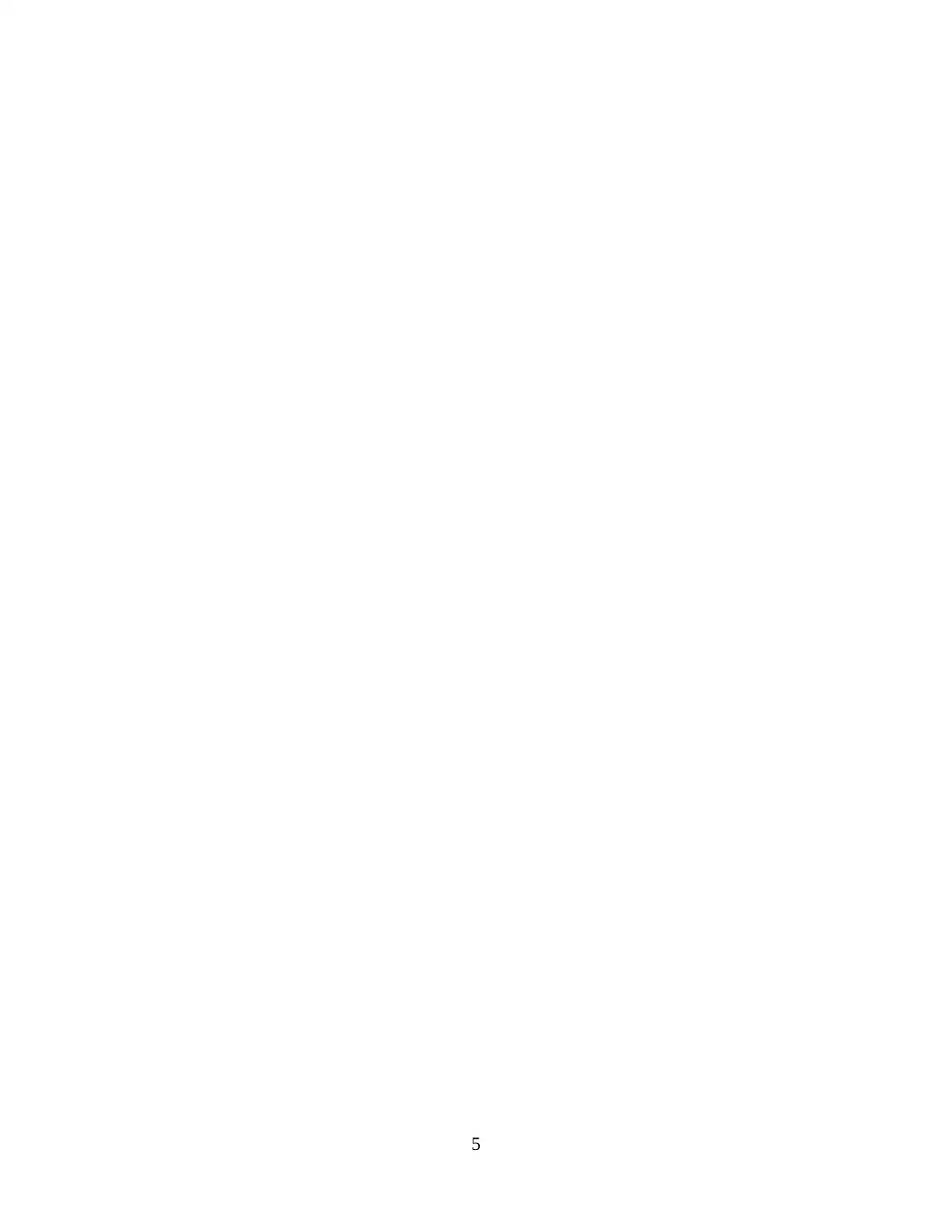
5
Paraphrase This Document
Need a fresh take? Get an instant paraphrase of this document with our AI Paraphraser
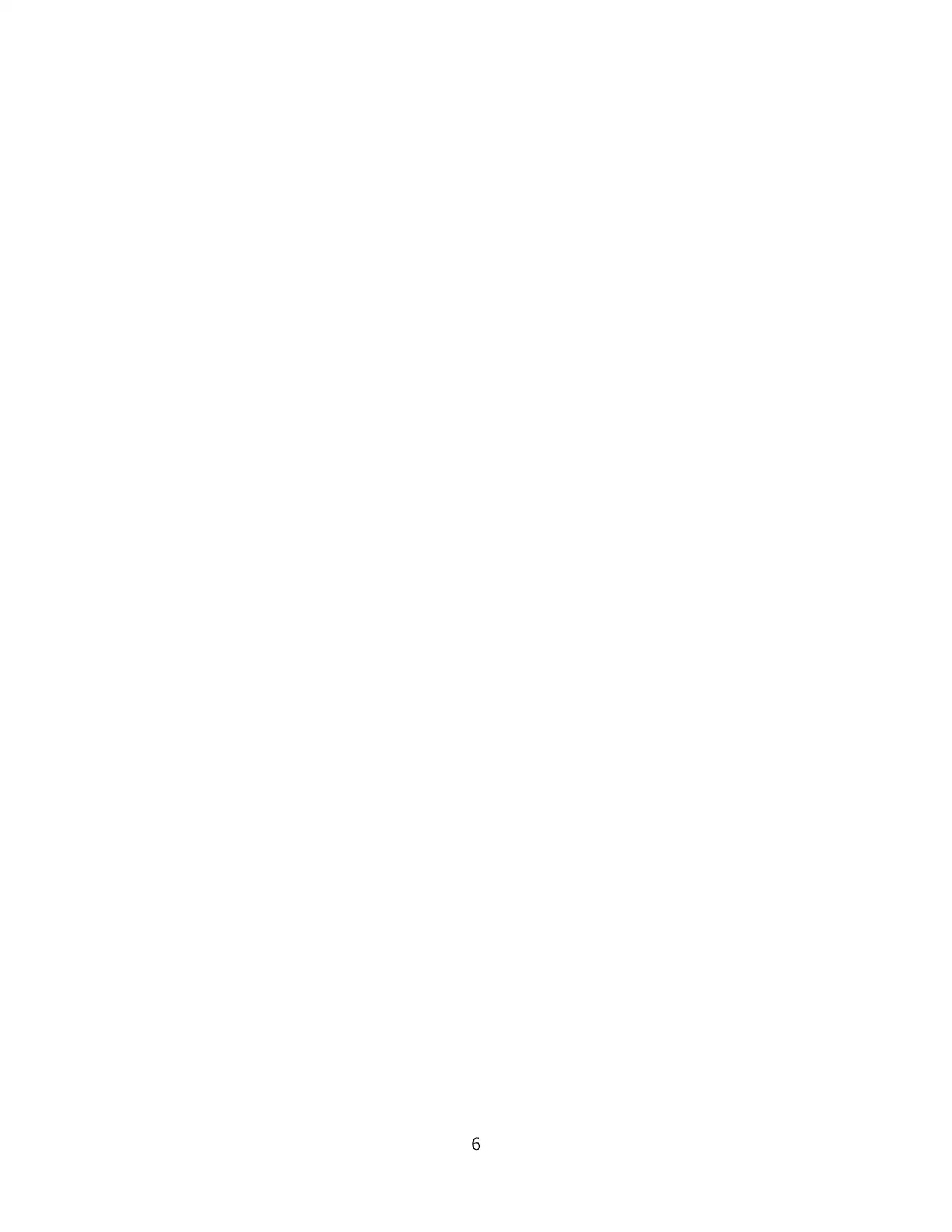
6
1 out of 8
Related Documents
Your All-in-One AI-Powered Toolkit for Academic Success.
+13062052269
info@desklib.com
Available 24*7 on WhatsApp / Email
![[object Object]](/_next/static/media/star-bottom.7253800d.svg)
Unlock your academic potential
Copyright © 2020–2026 A2Z Services. All Rights Reserved. Developed and managed by ZUCOL.





